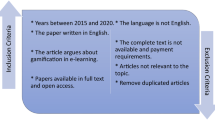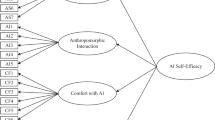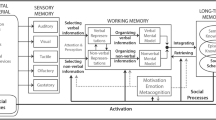Abstract
In the last years, the importance of context-aware software applications able to provide personalized and adaptive services has been growing. Moreover, new innovative technologies make it possible to embed context-aware applications into everyday life objects in order to implement seamless user experiences. The research in the field of Ambient Intelligence is focused on these technologies. In particular, Ambient Learning denotes the presence of new ICTs embedded into the environment which leads to advanced e-Learning scenarios. The literature provides a set of requirements, which characterize the Ambient Learning processes that are required to be permanent, goal-directed, interactive, embedded in dayly life situations, personalized and context-aware. Both frameworks and technological mappings are provided to drive the definition of ambient e-Learning systems, nevertheless Self Regulated Learning is partially addressed, and it is not clear how these frameworks can enable Self Regulatory Processes to foster life-long learning. The goal of the present work is to address the aforementioned criticisms, providing a new framework for Ambient Learning that may also leverage on collective knowledge and objective-driven learning aspects to be exploited in synergy with the pillars of existing approaches.








Similar content being viewed by others
References
Acampora G, Gaeta M, Loia G, Vasilakos A.V (2010) Interoperable and adaptive fuzzy services for ambient intelligence applications. ACM Transact Autonomous Adapt Syst 5(2):1–26
Albano G, Gaeta M, Ritrovato P (2007) IWT: an innovative solution for AGS e-Learning model
Allen CA, Mugisa EK (2010) Improving learning object reuse through ood: a theory of learning objects, journal of object technology. J Object Technol 9(6):51–75
Azevedo R (2005) Using hypermedia as a metacognitive tool for enhancing student learning? the role of self-regulated learning. Educ Psychol 40(4):199–209
Azevedo R (2007) Understanding the complex nature of self-regulatory processes in learning with computer-based learning environments: an introduction. Metacognit Learn 2(2–3):57–65
Azevedo R (2009a) Theoretical, conceptual, methodological, and instructional issues in research on metacognition and self-regulated learning: a discussion. Metacognit Learn 4(1):87–95
Azevedo R (2009b) Theoretical, conceptual, methodological, and instructional issues in research on metacognition and self-regulated learning: a discussion. Metacognit Learn 4(1):87–95
Azevedo R, Feyzi-behnagh R (2011) Dysregulated learning with advanced learning technologies. English 7:9–18
Azevedo R, Hadwin AF (2005) Scaffolding self-regulated learning and metacognition–implications for the design of computer-based scaffolds. Instruct Sci 33(5):367–379
Azevedo R, Witherspoon A, Chauncey A, Burkett C, Fike A (2009) MetaTutor: A MetaCognitive Tool for Enhancing Self-Regulated Learning MetaCognitive Tools for Enhancing learning, pp 14–19
Beckstein C, Denzler J, Fothe M, Knig-Ries B, Sack H, Vogel J (2007) A reactive architecture for ambient e-Learning. In Proceedings of towards ambient intelligence: methods for cooperating ensembles in ubiquitous environments (AIM-CU 2007)
Biswas G, Jeong H, Kinnebrew JS, Sulcer B, Roscoe R (2010) Measuring self-regulated learning skills through social interactions in a teachable agent environment. Learning 2:1–26 (in press)
Brusilovsky P, Milln E (2007) User models for adaptive hypermedia and adaptive educational systems. The adaptive web LNCS, vol 4321. Springer, Hidelberg, pp 3–53
Capuano N, Gaeta M, Marengo A, Miranda S, Orciuoli F, Ritrovato P (2009a) Lia: an intelligent advisor for e-Learning. Interact Learn Environ 17(3):221–239
Capuano N, Gaeta M, Orciuoli F, Ritrovato P (2009b) On-demand construction of personalized learning experiences using semantic web and web 2.0 techniques. In: 2009 ninth IEEE international conference on advanced learning technologies, pp 484–488
Costagliola G, De Rosa M, Fuccella V, Capuano N, Ritrovato P (2010) A novel approach for attention management in e-Learning systems, DMS. Knowledge Systems Institute, pp 222–227. ISBN 1-891706-28-4
Dabbagh N, Kitsantas A (2004a) Supporting self-regulation in student-centered web-based learning environments. Int J e-Learn 3(1):40–47
Dabbagh N, Kitsantas A (2004b) Supporting self-regulation in student-centered web-based learning environments. Int J e-Learn 3(1):40–47
Dettori G, Persico D (2008) Detecting self-regulated learning in online communities by means of interaction analysis. IEEE Transact Learn Technol 1(1):11–19
Dey AK, Abowd GD (2000) Towards a better understanding of context and context-awareness, vol 4. Springer-Verlag, Berlin, pp 304–307
Dix A, Finlay J, Abowd GD, Beale R (2004) Human-computer interaction, vol 3. Prentice Hall, London
Dong A, Diaz F, Chang Y, Zheng Z (2010) Time is of the essence : improving recency ranking using twitter data. North 331–340
Gaeta M, Orciuoli F, Ritrovato P (2009) Advanced ontology management system for personalised e-Learning. Know-Based Syst 22(4):292–301
Greene JA, Azevedo R (2007) A theoretical review of winne and hadwin’s model of self-regulated learning: New perspectives and directions. Rev Educ Res 77(3):334–372
Kaplan A (2008) Clarifying metacognition, self-regulation, and self-regulated learning: whats the purpose ? Educ Psychol Rev 20(4):477–484
Kemp R, Kemp E, Todd E (2009) Self-regulated fading in on-line learning. In Proceedings of the 2009 conference on artificial intelligence in education: building learning systems that care: from knowledge representation to affective modelling. IOS Press, Amsterdam, The Netherlands, pp 449–456. ISBN 978-1-60750-028-5
Kent JC, Kevin DB, Krista RM, Marykay O (2009) The role of goal orientation and self-efficacy in learning from web-based worked examples. J Interact Learn Res 20(4):385–403. ISSN 1093-023X
Kopcha TJ, Sullivan H (2008) Learner preferences and prior knowledge in learner-controlled computer-based instruction. Educ Technol Res Dev 56(3):265–286
Li Y, McLean DA, Bandar ZA, O’Shea J, Crockett K (2006) Sentence similarity based on semantic nets and corpus statistics. IEEE Transact Know Data Eng 18:1138–1150
Macarthur V, Conlan O (2010) Modeling higher-order cognitive skills in technology enhanced distance learning, pp 15–19
Mayer RE (2009) Advances in applying the science of learning and instruction to education. Psychol Sci Public Interest 9(3):i–ii
Paraskakis I (2005) Ambient learning: a new paradigm for e-Learning. Learning, pp 1–5
Pintrich PR (2004) A conceptual framework for assessing motivation and self-regulated learning in college students. Educ Psychol Rev 16(4):385–407
Rossi PG, Carletti S (2011) Mapit: a pedagogical-relational its. Proc Comput Sci 3:820826
Schloemer P, Brenan K (2006) From students to learners: developing self-regulated learning. J Educ Business 82(2):81–87
Sperling RA, Howard BC, Staley R, Dubois N (2004) Metacognition and self-regulated learning constructs. Educ Res Eval 10(2):117–139
Steffens K (2008) Technology enhanced learning environments for self-regulated learning: a framework for research. Technol Pedagogy Educ 17(3):221–232
Vasilakos A, Pedrycz W (2006) Ambient intelligence, wireless networking, and ubiquitous computing, artech House mobile communications series. Artech House, 2006. ISBN 9781580539630
Vockell E (1996) Educational psychology: a practical approach. Princeton Hall, New Jersey
Winne P (2005) A perspective on state-of-the-art research on self-regulated learning. Instruct Sci 33(5–6):559–565
Winne PH, Hadwin AF (2008) The weave of motivation and self-regulated learning. Lawrence Erlbaum Associates, Mahwah, pp 297–314
Winters FI, Greene JA, Costich CM (2008) Self-regulation of learning within computer-based learning environments: a critical analysis. Educ Psychol Rev 20(4):429–444
Witherspoon AM, Azevedo R, Cai Z (2009) Learners’ exploratory behavior within metatutor. In: Dimitrova V, Mizoguchi R, du Boulay B, Graesser AC (eds) AIED, volume 200 of frontiers in artificial intelligence and applications. IOS Press, Amsterdam, pp 644–646. ISBN 978-1-60750-028-5
Witherspoon A.M, Azevedo R, Lewis G (2005) Self-regulation of learning with multiple representations in hypermedia. In: Artificial intelligence in education Supporting learning through intelligent and socially informed technology, pp 2359–2364
Zimmerman B.J (1995) Self-regulation involves more than metacognition: a social cognitive perspective. Educa Psychol 30(4):217–221
Zimmerman BJ (2000a) Attaining self-regulation: a social cognitive perspective, vol 13. Academic Press, San Diego, pp 13–39
Zimmerman BJ (2000b) Self-efficacy: An essential motive to learn. Contemp Educ Psychol 25(1):82–91 http://www.ncbi.nlm.nih.gov/pubmed/10620383
Zimmerman B.J (2002) Becoming a self-regulated learner: an overview. Theory Into Practice 41(2):64–70
Zimmerman B.J (2008) Investigating self-regulation and motivation: historical background, methodological developments, and future prospects. Am Educ Res J 45(1):166–183
Author information
Authors and Affiliations
Corresponding author
Rights and permissions
About this article
Cite this article
Gaeta, M., Mangione, G.R., Orciuoli, F. et al. Ambient e-Learning: a metacognitive approach. J Ambient Intell Human Comput 4, 141–154 (2013). https://doi.org/10.1007/s12652-012-0111-5
Received:
Accepted:
Published:
Issue Date:
DOI: https://doi.org/10.1007/s12652-012-0111-5




